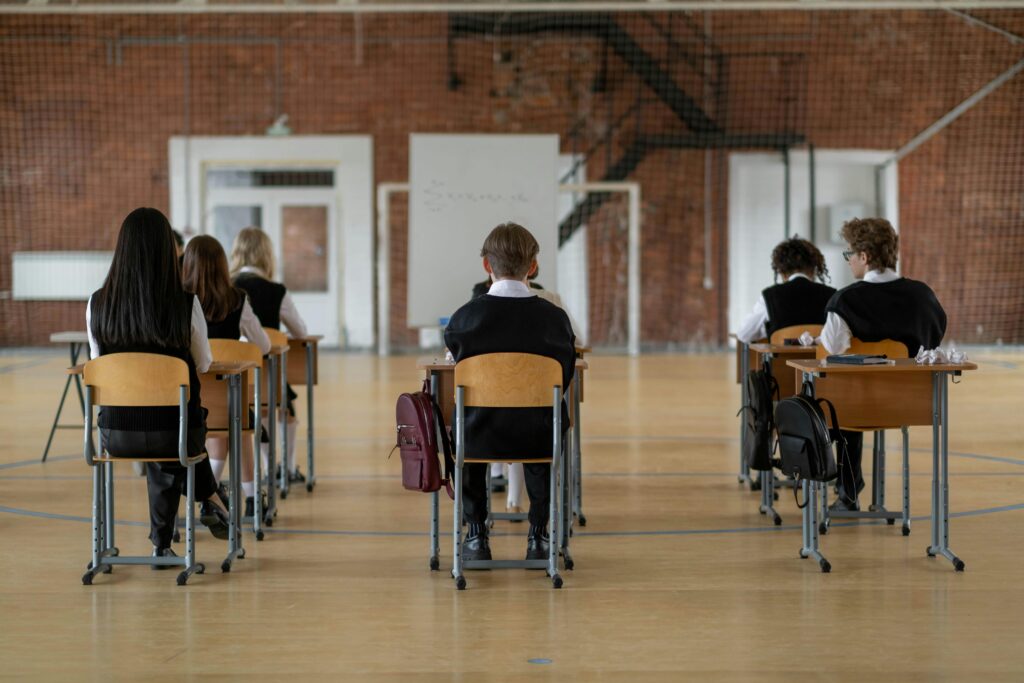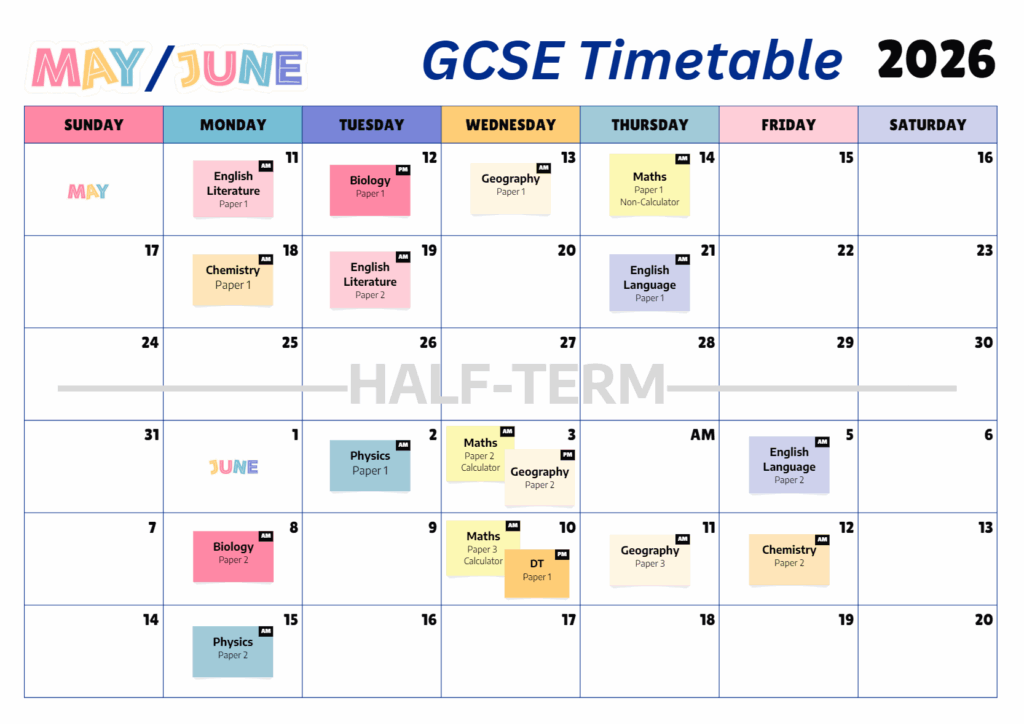GCSE Exam Dates 2026: What Parents Need to Know
It feels like everything is happening at once. Only last week we were finishing off E’s sixth form application, and now we’re already staring down the GCSE exam dates for 2026. To make it feel even more real, he’s already sat one GCSE this year — his school does the statistics exam in Year 10. His full set of choices for his GCSEs was triple science, art, and DT, so the big summer exam season in Year 11 is going to be a busy one.
This week we sat down together and made a personalised exam chart with all his dates on. It sounds simple, but it really helped to see it laid out. And the little win? His birthday falls right in the middle of exam season in May, when he turns 16, but luckily, he doesn’t have one scheduled that day. Small mercies!

When Do GCSEs Start and Finish in 2026?
The summer GCSE exam dates 2026 are set to run from the week commencing Monday 4 May until Friday 26 June.
These are the most up-to-date dates set by the exam boards, but they might shift slightly closer to the time. Think of them as a guide for planning, with the final, confirmed timetable coming from your child’s school.
Key GCSE Exam Dates 2026
Here are some of the headline subjects and when their papers are scheduled:
- Maths
- 7 May – WJEC Maths Unit 1 (foundation, intermediate, higher)
- 14 May – AQA/Edexcel Paper 1 (non-calculator)
- 3 June – AQA/Edexcel Paper 2 (calculator)
- 10 June – AQA/Edexcel Paper 3 (calculator)
- English Language
- 21 May – AQA, Edexcel, OCR, Eduqas Paper 1
- 5 June – AQA, Edexcel, OCR, Eduqas Paper 2
- English Literature
- 11 May – Paper 1 (all boards)
- 19 May – Paper 2 (most boards)
- Sciences
- Biology Paper 1 – 12 May (afternoon)
- Chemistry Paper 1 – 18 May (morning)
- Physics Paper 1 – 2 June (morning)
- Biology Paper 2 – 8 June (morning)
- Chemistry Paper 2 – 12 June (morning)
- Physics Paper 2 – 15 June (morning)
- Geography
- 13 May – Paper 1
- 3 June – Paper 2
- 11 June – Paper 3
- History
- 15 May – Paper 1
- 4 June – Paper 2
- 9 June – Paper 3 (Edexcel/OCR/CCEA)
This isn’t every single subject or paper (you’d be here all day scrolling through those), but it does give you a feel for how the exam season is spread out. The exact dates will depend on the exam board your child’s school uses — AQA, OCR, Edexcel, WJEC, CCEA, Eduqas — so it’s worth double-checking against the school’s own timetable. If you want the full breakdown, the BBC Bitesize exam dates page has everything laid out in detail.
What About Mocks and Coursework?
As if the summer exams weren’t enough, there are the mocks to think about too. Most schools run them in December or January of Year 11, and some squeeze in an extra set at the end of Year 10. They don’t carry the same weight as the real thing, but they do give you a very real sense of what the summer will be like — and they’re where predicted grades often come from.
Then there are the non-exam assessments, like language speaking tests or science practicals. These usually crop up before May and are scheduled by the school, so they can feel like they come out of nowhere if you’re not paying attention. Definitely one to watch for in the school emails, otherwise it’ll be a nasty surprise on a random Tuesday morning.
Creating a Personalised Schedule
Having all the dates printed in a timetable format really helps. For E, it meant he could see when his sciences were clumped together and where the lighter weeks fell. For us as parents, it gave a clearer picture of where to encourage revision and where to plan for downtime.
Want to make your own exam chart?

We’ve put together a simple blank GCSE exam dates 2026 timetable template you can download and fill in with your child’s dates. Print it, stick it up, colour-code it — whatever works best for your family.
Download the blank GCSE exam timetable here
The Reality for Parents
GCSEs 2026 might sound like they’re ages away, but once Year 11 gets going, it’ll fly past. Having the dates written down doesn’t magically make it all less stressful, but it does help everyone feel a bit more in control. For us, sticking E’s chart up on the fridge means no excuses for “forgetting” what’s coming next, and I can already see it stopping a few arguments before they start.
Revision timetables, though? That’s a whole other battle…
![[AD] ✨ Festive magic for local families in the heart of Guildford ✨
We had the loveliest evening exploring the @guildfordilluminate light trail at Guildford Castle
The trail takes around 30–40 mins
with cosy stops for hot chocolate and toasting marshmallows, it’s a gorgeous Christmas activity for Surrey families.
It’s on until 4th January and makes the perfect festive plan:
🛍️ Christmas shopping in town
✨ The light trail
🍽️ Finish with dinner in Guildford
If you’re looking for a magical, stress-free festive outing with the kids — this is one to add to your Christmas list
📍 Guildford Castle, Castle St, Guildford GU1 3SX
#GuildfordWithKids #SurreyFamilies #ChristmasInSurrey](https://suburban-mum.com/wp-content/uploads/2018/09/589257185_18566118850016840_4432952740767953046_n-180x320.jpg)
![[AD] We went to the newly opened Cha Sha Kingston a couple of weeks ago, and wow — taste bud adventure unlocked! The boys devoured the masala fries and chicken tikka rolls, while we couldn’t get enough of that epic kebab butter curry 😍🍛.
It’s amazing value for food this tasty (and everyone left happy and VERY full!).
Delicious food, vibrant vibes and incredible value — the perfect combo for your next meal.
📍Cha Sha Kingston
43 Surbiton Road, KT1 2HG
🌐 chasha.co.uk
Other Cha Sha locations in Birmingham, Ilford, Southampton and Wembkey
#ChaSha #ChaShaKingston #KingstonEats #FoodieFinds #UKFoodie #FoodReview #KingstonUponThames #FamilyEats #FamilyDining #FoodieKids](https://suburban-mum.com/wp-content/uploads/2016/02/574770541_18560351146016840_6855048070839528040_n-180x320.jpg)

![[AD] We’re a cricket-mad family, so we’re buzzing that @thehundred is back this August! 🏏🔥
To get ready, M tried out the official FREE Activity Pack — and it’s brilliant! 🙌
Packed with fun games, creative challenges and sporty tasks, it’s perfect for getting kids hyped whether you’re at home or on the go.
👉Download yours now (link in bio)
@londonspirit @ovalinvincibles #EveryMomentCounts #TheHundred
#EnglandCricket #CricketFamily #TheHundredCricket #LondonBloggers #Cricket #CricketIsLife #kidsfun](https://suburban-mum.com/wp-content/uploads/2022/11/505472555_18531279601016840_7092520074819907569_n-180x320.jpg)



![[AD - Press visit]
We enjoyed the glorious sunshine this weekend with a trip to Brighton. We went on the @brightoni360official which is right by the sea front.
The i360 pod take a slow journey up, allowing you to take in views across Brighton and the South Downs 450ft above ground. There’s a bar inside with drinks and snacks available to purchase and the experience lasts 25 minutes.
Afterwards, we headed to the open air roller rink for a roller skating session!
The roller rink is:
⭐ Suitable for over 5s
⭐ £6.50 if you have your own skates or £9.50 if you need to hire them
⭐ 45 minutes per session
Full details to visit the i360 + skating
📍 Brighton i360, Lower Kings Road, Brighton BN1 2LN
🚗 Parking nearby (we parked in the Regency Square Car park)
🎟️ Prices start from £25.40 for an adult and £16.90 for a child
🕐 Opening hours are currently Sun-Fri 10.30am-18.30pm and until 19.30pm on Saturdays
☕️ Bar inside the i360, cafe and gift shop
Book tickets here:
https://tickets.brightoni360.co.uk/tickets/?_ga=2.195305772.1869001490.1689671753-1757164059.1689671753/#events?eventid=157](https://suburban-mum.com/wp-content/uploads/2015/04/417980235_313576471048632_3682382982231216432_n.jpg)

![[AD] ***Summer of fun at Barracudas Activity Camps!****
There is plenty for kids to do at @barracudas_activity_day_camps
From Tennis, Archery, Swimming, Motor Sports and more you can be sure that there will be something for kids aged 4.5-14. ⚽🏈🥅🎾🏓🏎️🏹🏊♂️🏉
You can book on a day by day basis - so it can fit in with any other days out/activities you have planned and there are early drop off and late pickup options available. Barracudas are also Ofsted registered so you can use your Childcare Vouchers too.
⭐⭐⭐Get £20 off a week or £4 off a day using my discount code: MARIA20⭐⭐⭐
#BarracudasActivityDayCamp #BarracudasActivityCamp #BarracudaAmbassadors #SummerHolidays #SchoolHolidays #Summer2023 #SummerCamp #DayCare #Camp #KidsCamp #surreymummy #surreymums #SummerOfFun #ActivityCamps #HolidayCamps #Childcare #SchoolHolidays #schoolholidaycamps](https://suburban-mum.com/wp-content/uploads/2024/07/353583570_625625966167953_545896259645102575_n.jpg)



![[AD] We have some super exciting news...we have been chosen to be Laser Quest Ambassadors, and the boys are over the moon!
We are really lucky that our local Laser Quest (@laserquestkingston) is just around the corner from us. It means we can pop in of a weekend or anytime during the school holidays, and with summer just around the corner, I know Laser Quest will be one of our go-to places for some family fun.
As well as games of Laser Quest, there are also VR experiences and arcade amusements too. To find out a bit more about how Laser Quest works, you can read my blog post: https://www.suburban-mum.com/laser-quest-kingston/ (clickable link in bio)
Don't forget to keep an eye out for our Laser Quest posts - I'm going to be giving away two family passes to use at Laserquest Kingston!
If you can't wait and want to head down to Laser Quest to try it out, use the code SUMMER30 for 30% off your booking. The code is valid from now until the end of August 2023 and can be used on Laser Quest games and birthday party bookings.
#LaserquestAmbassador #Laserquest #LaserquestKingston #ActivitiesForKids #FamilyFun #DaysOutWithKids #Lasertag #LaserquestVR #Kingston #ThingsToDoInKingston #SurreyFamilyDaysOut #ThingsToDoWithKids #RainyDayFun #SurreyMummy #SurreyLife #LifeWithKids #LifeWithBoys #familyfunday](https://suburban-mum.com/wp-content/uploads/2015/04/353230107_797358078406942_2405522556733455165_n.jpg)

![[AD] The sun has finally made an appearance and the boys have been making the most of it by spending it
in the garden.
They’re go-to is always football and they’ve been trying to improve their aim and accuracy with the new Messi Foldable Footlball goal from the #MessiTrainingSystem range.
I love the fact the goal is foldable, making it easy to store away when not in use. It is also lightweight so you can effortlessly pack it up and take it to the park or to a friend’s house.
The Messi Foldable Football Goal retails at £36 and can be purchased from @argos
You can read my full review here: https://www.suburban-mum.com/messi-foldable-football-goal/
#TrainLikeMessi #FoldableFootballGoal #FootballSkills #OutdoorFun #LionelMessi #LeoMessi #FootballAtHome #OutdoorKids #JustGetOutside #OutdoorsAndFree #ScreenFreeKids #WhateverTheWeatherKids @flair_gp](https://suburban-mum.com/wp-content/uploads/2015/04/341194882_615024710178056_41977149395989448_n.jpg)

![[AD] We are absolutely thrilled to announce that we are Barracuda Ambassadors again this year.
With Easter just around the corner, the boys were sent the @barracudas_activity_day_camps new camp kit in preparation for the school holidays.
There’s a wide range of activities for kids aged 4.5 - 14 including Tennis, Archery, Basketball, Arts & Crafts and more.
If you like the sound of Barracudas, find out more over on their website. You can also save £20 a week or £4 a day, using my discount code: MARIA20](https://suburban-mum.com/wp-content/uploads/2024/07/336812306_765234558514317_685553691647241974_n.jpg)





